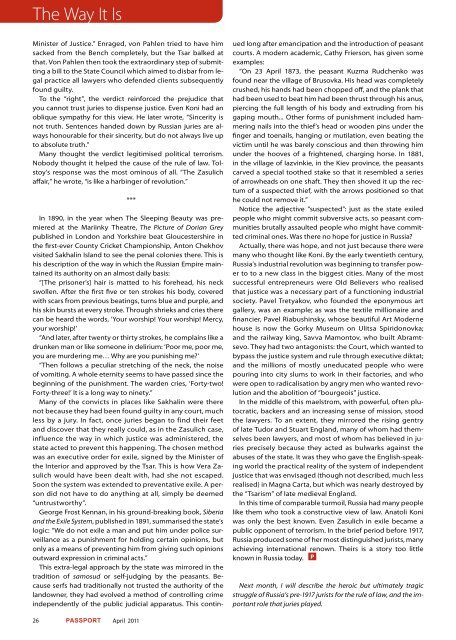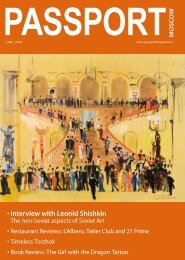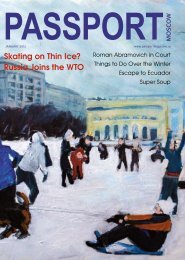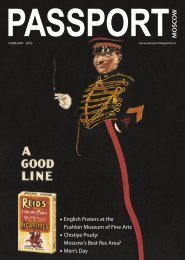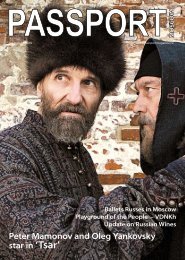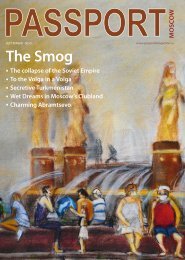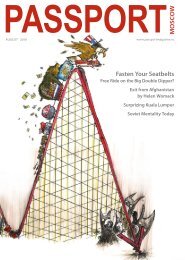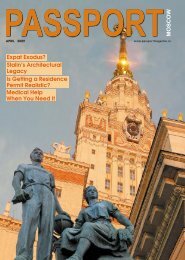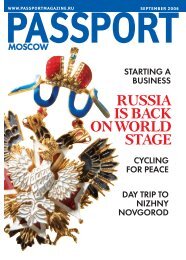Feminism in Russia - Passport magazine
Feminism in Russia - Passport magazine
Feminism in Russia - Passport magazine
Create successful ePaper yourself
Turn your PDF publications into a flip-book with our unique Google optimized e-Paper software.
The Way It Is<br />
M<strong>in</strong>ister of Justice.” Enraged, von Pahlen tried to have him<br />
sacked from the Bench completely, but the Tsar balked at<br />
that. Von Pahlen then took the extraord<strong>in</strong>ary step of submitt<strong>in</strong>g<br />
a bill to the State Council which aimed to disbar from legal<br />
practice all lawyers who defended clients subsequently<br />
found guilty.<br />
To the “right”, the verdict re<strong>in</strong>forced the prejudice that<br />
you cannot trust juries to dispense justice. Even Koni had an<br />
oblique sympathy for this view. He later wrote, “S<strong>in</strong>cerity is<br />
not truth. Sentences handed down by <strong>Russia</strong>n juries are always<br />
honourable for their s<strong>in</strong>cerity, but do not always live up<br />
to absolute truth.”<br />
Many thought the verdict legitimised political terrorism.<br />
Nobody thought it helped the cause of the rule of law. Tolstoy’s<br />
response was the most om<strong>in</strong>ous of all. “The Zasulich<br />
affair,” he wrote, “is like a harb<strong>in</strong>ger of revolution.”<br />
***<br />
In 1890, <strong>in</strong> the year when The Sleep<strong>in</strong>g Beauty was premiered<br />
at the Mari<strong>in</strong>ky Theatre, The Picture of Dorian Grey<br />
published <strong>in</strong> London and Yorkshire beat Gloucestershire <strong>in</strong><br />
the first-ever County Cricket Championship, Anton Chekhov<br />
visited Sakhal<strong>in</strong> Island to see the penal colonies there. This is<br />
his description of the way <strong>in</strong> which the <strong>Russia</strong>n Empire ma<strong>in</strong>ta<strong>in</strong>ed<br />
its authority on an almost daily basis:<br />
“[The prisoner’s] hair is matted to his forehead, his neck<br />
swollen. After the first five or ten strokes his body, covered<br />
with scars from previous beat<strong>in</strong>gs, turns blue and purple, and<br />
his sk<strong>in</strong> bursts at every stroke. Through shrieks and cries there<br />
can be heard the words, ‘Your worship! Your worship! Mercy,<br />
your worship!’<br />
“And later, after twenty or thirty strokes, he compla<strong>in</strong>s like a<br />
drunken man or like someone <strong>in</strong> delirium: ‘Poor me, poor me,<br />
you are murder<strong>in</strong>g me… Why are you punish<strong>in</strong>g me?’<br />
“Then follows a peculiar stretch<strong>in</strong>g of the neck, the noise<br />
of vomit<strong>in</strong>g. A whole eternity seems to have passed s<strong>in</strong>ce the<br />
beg<strong>in</strong>n<strong>in</strong>g of the punishment. The warden cries, ‘Forty-two!<br />
Forty-three!’ It is a long way to n<strong>in</strong>ety.”<br />
Many of the convicts <strong>in</strong> places like Sakhal<strong>in</strong> were there<br />
not because they had been found guilty <strong>in</strong> any court, much<br />
less by a jury. In fact, once juries began to f<strong>in</strong>d their feet<br />
and discover that they really could, as <strong>in</strong> the Zasulich case,<br />
<strong>in</strong>fluence the way <strong>in</strong> which justice was adm<strong>in</strong>istered, the<br />
state acted to prevent this happen<strong>in</strong>g. The chosen method<br />
was an executive order for exile, signed by the M<strong>in</strong>ister of<br />
the Interior and approved by the Tsar. This is how Vera Zasulich<br />
would have been dealt with, had she not escaped.<br />
Soon the system was extended to preventative exile. A person<br />
did not have to do anyth<strong>in</strong>g at all, simply be deemed<br />
“untrustworthy”.<br />
George Frost Kennan, <strong>in</strong> his ground-break<strong>in</strong>g book, Siberia<br />
and the Exile System, published <strong>in</strong> 1891, summarised the state’s<br />
logic: “We do not exile a man and put him under police surveillance<br />
as a punishment for hold<strong>in</strong>g certa<strong>in</strong> op<strong>in</strong>ions, but<br />
only as a means of prevent<strong>in</strong>g him from giv<strong>in</strong>g such op<strong>in</strong>ions<br />
outward expression <strong>in</strong> crim<strong>in</strong>al acts.”<br />
This extra-legal approach by the state was mirrored <strong>in</strong> the<br />
tradition of samosud or self-judg<strong>in</strong>g by the peasants. Because<br />
serfs had traditionally not trusted the authority of the<br />
landowner, they had evolved a method of controll<strong>in</strong>g crime<br />
<strong>in</strong>dependently of the public judicial apparatus. This cont<strong>in</strong>-<br />
2 April 2011<br />
ued long after emancipation and the <strong>in</strong>troduction of peasant<br />
courts. A modern academic, Cathy Frierson, has given some<br />
examples:<br />
“On 23 April 1873, the peasant Kuzma Rudchenko was<br />
found near the village of Brusovka. His head was completely<br />
crushed, his hands had been chopped off, and the plank that<br />
had been used to beat him had been thrust through his anus,<br />
pierc<strong>in</strong>g the full length of his body and extrud<strong>in</strong>g from his<br />
gap<strong>in</strong>g mouth... Other forms of punishment <strong>in</strong>cluded hammer<strong>in</strong>g<br />
nails <strong>in</strong>to the thief’s head or wooden p<strong>in</strong>s under the<br />
f<strong>in</strong>ger and toenails, hang<strong>in</strong>g or mutilation, even beat<strong>in</strong>g the<br />
victim until he was barely conscious and then throw<strong>in</strong>g him<br />
under the hooves of a frightened, charg<strong>in</strong>g horse. In 1881,<br />
<strong>in</strong> the village of Iazv<strong>in</strong>kie, <strong>in</strong> the Kiev prov<strong>in</strong>ce, the peasants<br />
carved a special toothed stake so that it resembled a series<br />
of arrowheads on one shaft. They then shoved it up the rectum<br />
of a suspected thief, with the arrows positioned so that<br />
he could not remove it.”<br />
Notice the adjective “suspected”: just as the state exiled<br />
people who might commit subversive acts, so peasant communities<br />
brutally assaulted people who might have committed<br />
crim<strong>in</strong>al ones. Was there no hope for justice <strong>in</strong> <strong>Russia</strong>?<br />
Actually, there was hope, and not just because there were<br />
many who thought like Koni. By the early twentieth century,<br />
<strong>Russia</strong>’s <strong>in</strong>dustrial revolution was beg<strong>in</strong>n<strong>in</strong>g to transfer power<br />
to to a new class <strong>in</strong> the biggest cities. Many of the most<br />
successful entrepreneurs were Old Believers who realised<br />
that justice was a necessary part of a function<strong>in</strong>g <strong>in</strong>dustrial<br />
society. Pavel Tretyakov, who founded the eponymous art<br />
gallery, was an example; as was the textile millionaire and<br />
f<strong>in</strong>ancier, Pavel Riabush<strong>in</strong>sky, whose beautiful Art Moderne<br />
house is now the Gorky Museum on Ulitsa Spiridonovka;<br />
and the railway k<strong>in</strong>g, Savva Mamontov, who built Abramtsevo.<br />
They had two antagonists: the Court, which wanted to<br />
bypass the justice system and rule through executive diktat;<br />
and the millions of mostly uneducated people who were<br />
pour<strong>in</strong>g <strong>in</strong>to city slums to work <strong>in</strong> their factories, and who<br />
were open to radicalisation by angry men who wanted revolution<br />
and the abolition of “bourgeois” justice.<br />
In the middle of this maelstrom, with powerful, often plutocratic,<br />
backers and an <strong>in</strong>creas<strong>in</strong>g sense of mission, stood<br />
the lawyers. To an extent, they mirrored the ris<strong>in</strong>g gentry<br />
of late Tudor and Stuart England, many of whom had themselves<br />
been lawyers, and most of whom has believed <strong>in</strong> juries<br />
precisely because they acted as bulwarks aga<strong>in</strong>st the<br />
abuses of the state. It was they who gave the English-speak<strong>in</strong>g<br />
world the practical reality of the system of <strong>in</strong>dependent<br />
justice that was envisaged (though not described, much less<br />
realised) <strong>in</strong> Magna Carta, but which was nearly destroyed by<br />
the “Tsarism” of late medieval England.<br />
In this time of comparable turmoil, <strong>Russia</strong> had many people<br />
like them who took a constructive view of law. Anatoli Koni<br />
was only the best known. Even Zasulich <strong>in</strong> exile became a<br />
public opponent of terrorism. In the brief period before 1917,<br />
<strong>Russia</strong> produced some of her most dist<strong>in</strong>guished jurists, many<br />
achiev<strong>in</strong>g <strong>in</strong>ternational renown. Theirs is a story too little<br />
known <strong>in</strong> <strong>Russia</strong> today. P<br />
Next month, I will describe the heroic but ultimately tragic<br />
struggle of <strong>Russia</strong>’s pre-1917 jurists for the rule of law, and the important<br />
role that juries played.


